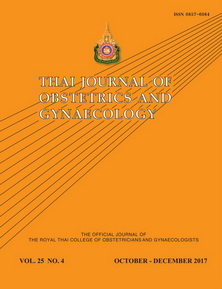Serum Squamous Cell Carcinoma Antigen and Its Application in Cervical Cancer Patients
Main Article Content
Abstract
Cervical cancer is the second most common female cancer in Thailand. The treatment depends on the stages of disease. Serum squamous cell carcinoma antigen (SCC-Ag) produces through squamous formation of cervical squamous epithelium and increased during the neoplastic transformation. However, it is not organ specific. In healthy women, serum SCC-Ag is found at a concentration of less than 1.9 μg/L. The cervical cancer clinical utilities of serum SCC-Ag reported in the literatures comprised of the indicative of pelvic or paraaortic lymph node metastases at the pretreatment evaluation period, the prediction of prognosis, the monitor the treatment response and the detection of early recurrence. With the limitation in health care resources of Thailand, raising of serum SCC-Ag also reminds the physician about distant recurrence of disease. Moreover, the detection of asymptomatic recurrence may be associated with prolonged survival.
Keywords: cervical cancer, SCC-Ag
Article Details
References
2. Jemal A, Bray F, Center MM, Ferlay J, Ward E, Forman D. Global cancer statistics. CA Cancer J Clin 2011;61:69-90.
3. Imsamran W, Pongnikorn D, Suwanrungrung K, Sangrajrang S, Buasom R. Cancer in Thailand vol VIII, 2010-2012. New Thammada Press (Thailand) Co., Ltd.: Cancer Registry Unit, National Cancer Institute Thailand 2015.
4. Watson M, Saraiya M, Benard V, Coughlin SS, Flowers L, Cokkinides V, et al. Burden of cervical cancer in the United States, 1998-2003. Cancer 2008;113(10 Suppl):2855-64.
5. Kato H, Torigoe T. Radioimmunoassay for tumor antigen of human cervical squamous cell carcinoma. Cancer 1977;40:1621-8.
6. Maruo T, Yoshida S, Samoto T, Tateiwa Y, Peng X, Takeuchi S, et al. Factors regulating SCC antigen expression in squamous cell carcinoma of the uterine cervix. Tumour Biol 1998;19:494-504.
7. Ohara K, Tanaka Y, Tsunoda H, Nishida M, Sugahara S, Itai Y. Assessment of cervical cancer radioresponse by serum squamous cell carcinoma antigen and magnetic resonance imaging. Obstet Gynecol 2002;100:781-7.
8. Sturgeon CM, Duffy MJ, Hofmann BR, Lamerz R, Fritsche HA, Gaarenstroom K, et al. National academy of clinical biochemistry laboratory medicine practice guidelines for use of tumor markers in liver, bladder, cervical, and gastric cancers. Clin Chem 2010;56:e1-e48.
9. Uemura Y, Pak SC, Luke C, Cataltepe S, Tsu C, Schick C, et al. Circulating serpin tumor markers SCCA1 and SCCA2 are not actively secreted but reside in the cytosol of squamous carcinoma cells. Int J Cancer 2000;89:368-77.
10. Gadducci AT, Cosio R, Genazzani S. The serum assay of tumour markers in the prognostic evaluation, treatment monitoring and follow-up of patients with cervical cancer: a review of the literature. Crit Rev Oncol Hematol 2008;66:10-20.
11. Huang EY, Wang CJ, Chen HC, Fang FM, Huang YJ, Wang CY, et al. Multivariate Analysis of Para-Aortic Lymph Node Recurrence After Definitive Radiotherapy for Stage IB-IVA Squamous Cell Carcinoma of Uterine Cervix. In J Radiat Oncol Biol Physics 2008;72:834-42.
12. Lekskul NC, Lertkhachonsuk C, Rattanasiri AA, Na Ayudhya S. The level of squamous cell carcinoma antigen and lymph node metastasis in locally advanced cervical cancer. Asian Pac J Cancer Prev 2015;16:4719-22.
13. Ogino I, Nakayama H, Okamoto N, Kitamura T, Inoue T. The role of pretreatment squamous cell carcinoma antigen level in locally advanced squamous cell carcinoma of the uterine cervix treated by radiotherapy. Int J Gynecol Cancer 2006;16:1094-100.
14. Reesink-Peters N, van der Velden J, Ten Hoor KA, Boezen HM, De Vries EGE, Schilthuis MS, et al. Preoperative serum squamous cell carcinoma antigen levels in clinical decision making for patients with early-stage cervical cancer. J Clin Oncol 2005;23:1455-62.
15. Liu SCH, Hu EY, Ou CF, ChangChien YC, Wang CC, Tsai CJ, et al. Pretreatment Factors Associated with Recurrence for Patients with Cervical Cancer International Federation of Gynecology and Obstetrics Stage IB1 Disease. Gynecol Obstet Invest 2016;81:339-45.
16. Jeong BKC, Huh DH, Park SJ, Bae W, Kim DS. The role of squamous cell carcinoma antigen as a prognostic and predictive factor in carcinoma of uterine cervix. Radiat Oncol J 2011;29:191-8.
17. Kawaguchi R, Furukawa N, Kobayashi H, Asakawa I. Posttreatment cut-off levels of squamous cell carcinoma antigen as a prognostic factor in patients with locally advanced cervical cancer treated with radiotherapy. J Gynecol Oncol 2013;24:313-20.
18. Hashimoto K, Yonemori K, Katsumata N, Hirakawa A, Hirata T, Yamamoto H, et al. Use of squamous cell carcinoma antigen as a biomarker of chemotherapy response in patients with metastatic cervical carcinoma. Eur J Obstet Gynecol Reprod Biol 2011;159:394-8.
19. Yoon SMS, Kim KH, Seo JY, Park SS, Moon SY, Cho SH. Use of serum squamous cell carcinoma antigen for follow-up monitoring of cervical cancer patients who were treated by concurrent chemoradiotherapy. Radiat Oncol 2010;5:78.
20. Shimura KM, Yokoi S, Sasano T, Sawada T, Hamasaki K, Kimura T. Utility of serum squamous cell carcinoma antigen levels at the time of recurrent cervical cancer diagnosis in determining the optimal treatment choice. J Gynecol Oncol 2013;24:321-9.
21. Ryu HKB, Kang JS, Kim WD. The prognostic value of squamous cell carcinoma antigen for predicting tumor recurrence in cervical squamous cell carcinoma patients. Obstet Gynecol Sci 2015;58:368-76.
22. Hirakawa M, Nagai Y, Inamine M, Kamiyama K, Ogawa K, Toita T, et al. Predictive factor of distant recurrence in locally advanced squamous cell carcinoma of the cervix treated with concurrent chemoradiotherapy. Gynecol Oncol 2008;108:126-9.
23. Zanagnolo V, Ming L, Gadducci A, Maggino T, Sartori E, Zola P, et al. Surveillance procedures for patients with cervical carcinoma a review of the literature. Int J Gynecol Cancer 2009;19:194-201.


